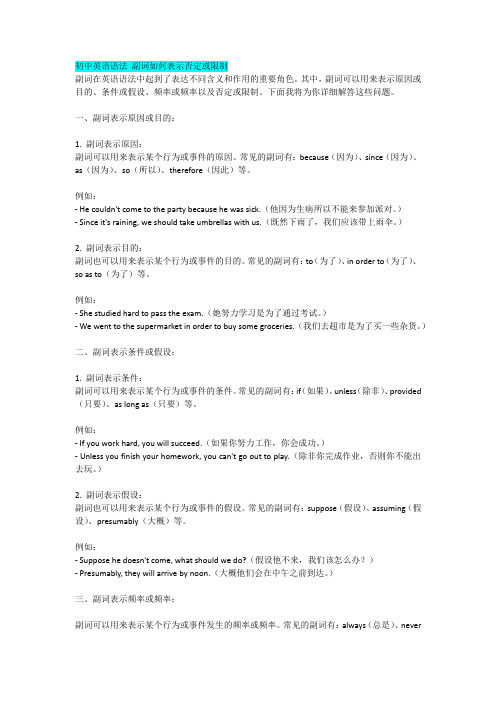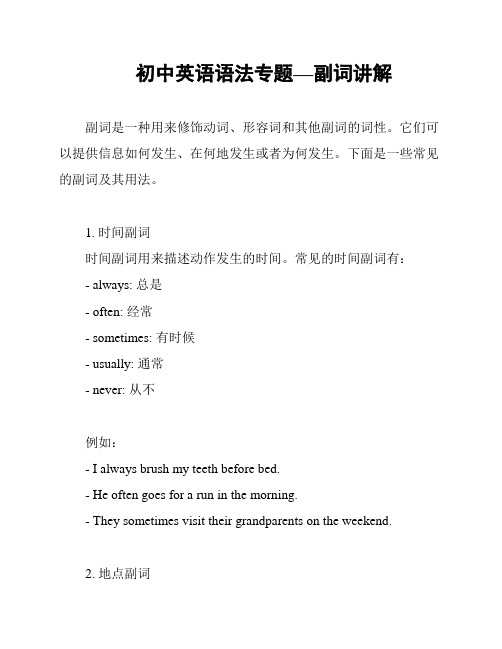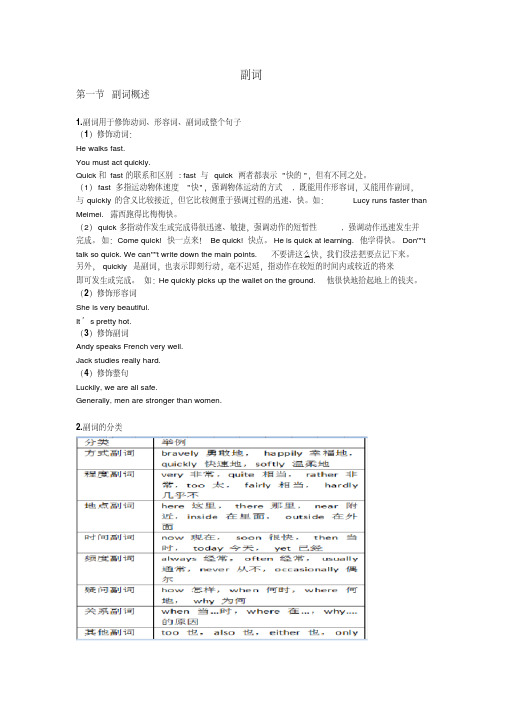初中英语语法副词
初中英语语法 副词如何表示否定或限制

初中英语语法副词如何表示否定或限制副词在英语语法中起到了表达不同含义和作用的重要角色。
其中,副词可以用来表示原因或目的、条件或假设、频率或频率以及否定或限制。
下面我将为你详细解答这些问题。
一、副词表示原因或目的:1. 副词表示原因:副词可以用来表示某个行为或事件的原因。
常见的副词有:because(因为)、since(因为)、as(因为)、so(所以)、therefore(因此)等。
例如:- He couldn't come to the party because he was sick.(他因为生病所以不能来参加派对。
)- Since it's raining, we should take umbrellas with us.(既然下雨了,我们应该带上雨伞。
)2. 副词表示目的:副词也可以用来表示某个行为或事件的目的。
常见的副词有:to(为了)、in order to(为了)、so as to(为了)等。
例如:- She studied hard to pass the exam.(她努力学习是为了通过考试。
)- We went to the supermarket in order to buy some groceries.(我们去超市是为了买一些杂货。
)二、副词表示条件或假设:1. 副词表示条件:副词可以用来表示某个行为或事件的条件。
常见的副词有:if(如果)、unless(除非)、provided (只要)、as long as(只要)等。
例如:- If you work hard, you will succeed.(如果你努力工作,你会成功。
)- Unless you finish your homework, you can't go out to play.(除非你完成作业,否则你不能出去玩。
)2. 副词表示假设:副词也可以用来表示某个行为或事件的假设。
初中英语语法知识精讲:常用副词考法归纳6

初中英语语法知识精讲:常用副词考法归纳6英语副词的分类(1) 时间副词:常见的有now, then, soon, ago, recently, lately, later, before, early, today, tomorrow, yesterday, tonight, suddenly, immediately, still, already, just等。
如:An idea suddenly struck me.我心中忽然产生一个念头。
(2) 地点副词:常见的有here, there, up, down, away, nearby, home, ahead, abroad, indoors, overseas, upstairs, downstairs 等。
如:I am considering going abroad.我正在考虑出国。
(3) 方式副词:表示行为方式的副词大多以-ly结尾,常见的有quietly, heavily, warmly, carefully, happily, politely, angrily等。
如:Look at the picture carefully.仔细看这幅画。
(4) 频度副词:常见的有always, usually, often, frequently, constantly, occasionally, sometimes, seldom, hardly, rarely, never等。
Sometimes he gets up early.他有时起得早。
(5) 程度副词:常见的有fairly, pretty, rather, quite, very, much, too, greatly, almost, nearly, half, highly, deeply, partly, perfectly, really等。
如:The film was quite good.这个电影不错。
初中英语语法之形容词,副词

初中英语语法之形容词&副词初中英语语法之形容词&副词形容词副词的原级、比较级和最高级1、分类:形容词和副词有原级、比较级和最高级三级。
2、规则变化:(1)单音节和部分双音节形容词和副词,在原级的后面加上er,est构成比较级和最高级。
a)直接加er,est :b)以重读闭音节结尾的,要双写最后一个辅音字母,后加er,est:c)以辅音字母+y结尾的,先把y改为i再加上er,est:(2)两个音节或两个以上的音节的,在原级前加more / most.3、不规则变化:原级比较级最高级good好的better更好的best最好的well好;(身体)好的,bad,badly糟糕的,糟糕地worse更糟糕的,更糟糕地;(身体)更不舒服的worst最糟糕的,最糟糕地;(身体)最不舒服的ill(身体)不舒服的many许多的(可数)more更多的;更most最多的;最much许多的(不可数);非常little少的less更少的least最少的far远的;远地farther更远的;更远地farthest最远的;最远地further进一步的(地)furthest最深刻的(地)4、形容词和副词的原级、比较级和最高级的用法:(1) 讲述某人/物自身的情况时,用原级。
基本句型是:主语(sb./sth) + 谓语动词+(very/too/so/quite/rather…) + 形容词/副词原级+….如:He is very oldnow. 他现在很老了。
They ran quitefast. 它们跑得相当快。
The weatherlooks rather bad. 天气看上去相当糟。
I am sohappy! 我是如此的快乐!☆表示两者之间没有差别时,使用句型:主语(第一个人物) + 谓语动词 + as + 形容词/副词原级 + as + 第二个人物+….如He is as excited as his younger sister. 他和他妹妹一样兴奋。
初中英语语法专题—副词讲解

初中英语语法专题—副词讲解副词是一种用来修饰动词、形容词和其他副词的词性。
它们可以提供信息如何发生、在何地发生或者为何发生。
下面是一些常见的副词及其用法。
1. 时间副词时间副词用来描述动作发生的时间。
常见的时间副词有:- always: 总是- often: 经常- sometimes: 有时候- usually: 通常- never: 从不例如:- I always brush my teeth before bed.- He often goes for a run in the morning.- They sometimes visit their grandparents on the weekend.2. 地点副词地点副词用来描述动作发生的地点。
常见的地点副词有:- here: 这里- there: 那里- everywhere: 到处- nearby: 附近- far: 远离例如:- Put the book here.- I want to go there.- You can find flowers everywhere in the garden.3. 程度副词程度副词用来描述动作或形容词的程度。
常见的程度副词有:- very: 非常- extremely: 极其- quite: 相当- too: 太- slightly: 稍微例如:- The movie was very interesting.- She is extremely talented in singing.- The food is quite delicious.4. 方式副词方式副词用来描述动作发生的方式。
常见的方式副词有:- slowly: 慢慢地- quickly: 快速地- carefully: 小心地- loudly: 大声地- quietly: 静静地例如:- Walk slowly in the park.- She speaks quickly.- Drive carefully on the road.记住,副词可以帮助我们更生动地描述动作的具体细节,让我们的语言更加丰富多样。
初中英语语法专题-副词(附练习答案)

副词第一节副词概述1.副词用于修饰动词、形容词、副词或整个句子(1)修饰动词:He walks fast.You must act quickly.Quick和fast的联系和区别: fast 与quick 两者都表示"快的",但有不同之处。
(1)fast多指运动物体速度"快",强调物体运动的方式, 既能用作形容词,又能用作副词,与quickly的含义比较接近,但它比较侧重于强调过程的迅速、快。
如:Lucy runs faster than Meimei. 露西跑得比梅梅快。
(2)quick多指动作发生或完成得很迅速、敏捷,强调动作的短暂性, 强调动作迅速发生并完成。
如:Come quick! 快一点来!Be quick! 快点。
He is quick at learning. 他学得快。
Don''''t talk so quick. We can''''t write down the main points. 不要讲这么快,我们没法把要点记下来。
另外,quickly是副词,也表示即刻行动,毫不迟延,指动作在较短的时间内或较近的将来即可发生或完成。
如:He quickly picks up the wallet on the ground. 他很快地拾起地上的钱夹。
(2)修饰形容词She is very beautiful.It’s pretty hot.(3)修饰副词Andy speaks French very well.Jack studies really hard.(4)修饰整句Luckily, we are all safe.Generally, men are stronger than women.2.副词的分类第二节副词的构成和比较等级1.形容词构成副词的一般规则有些形容词和副词同形,如:back adj. 后面的back adv. 向后地2.副词的比较等级(1)单音节词,加-er和-est(2)双音节词及多音节词,加more 和most但是early 的比较级和最高级则分别为:earlier earliest (3)不规则变化的词farther/ farthest, further /furthest的用法farther/ farthest和further /furthest都可用于表示距离和时间上的远We can go farther/further.We can look back farther/further into the past to find the truth.further /furthest 还可表示程度上的“深远”“进一步”The police will research further into this matter.3.原级比较常用句型,,as+副词原级+as,.该句型表示:,.和,..一样He speaks as loudly as you do.,.not as (so)+副词原级+as...该句型表示:,..不如,..I can’t walk as/so fast as you.他没有你反应的快。
初中英语语法副词的使用方法有什么

初中英语语法副词的使用方法有什么在阅读一篇新的英语文章或观看一个新的英语视频时,给你自己定下一个语法目标。
例如,试着写下你正在学习的一个形式,例如副词的使用方法。
下面是小编给大家带来的初中英语语法副词的使用方法,欢迎大家阅读参考,我们一起来看看吧!初中英语:时间副词时间副词:常见时间副词的有now, then, soon, ago, recently, lately, later, finally, before, early, today tomorrow, yesterday, tonight, suddenly, immediately, already, just 等。
时间副词在句子中的位置及用法举例:1. 确定的时间放在句尾,强调时可以放在句首,但不位于句中。
例如:Will you be free tomorrow? 你明天有空吗?At 7 o'clock last night, I was chatting with my friends online. 昨天晚上7点的时候,我正和我的朋友在网上聊天。
2. 如果句子中有两个或两个以上的时间副词,一般小时间在前,大时间在后。
例如:An earthquake took place in the downtown at around 8 p. m. last night. 昨晚大概8点市中心发生了地震。
时间副词在句中的位置:(1) 表确定时间的副词(如today, yesterday等)通常位于句末,强调时可以放在句首,但不位于句中:He went home yesterday. / Yesterday he went home. 他昨天回家了。
而那些表示非确定时间的副词(如 soon, recently, suddenly等)除可用于句末或句首外,还可位于句中(通常位于实意动词之前,动词be、助动词、情态动词之后):He went to Paris recently. / He recently went to Paris. /Recently he went to Paris. 最近他去了巴黎。
英语语法副词的种类及分析
英语语法副词的种类及分析一.什么是副词副词(adverb)修饰动词、形容词和其他副词等,说明时间、地点、水准、方式等概念。
如:often往往,here 这里,very很,quickly很快地。
二.副词的构成1)本身就是副词,如now现在,there那里,here。
2)由形容词加词尾-1y变来,如firmly坚决地,happi1y幸福地。
long adj. 长的,长久的long adv. 长久地三.副词的种类副词可分为下列几种:1)普通副词(ordinary adverb)如:together一起,well好,seriously认真地,slowly慢,carefully小心地。
2)疑问副词(interrogative adverb)如:when何时,where何地,how如何,why为何。
3)关系副词(relative adverb)如:where,when。
4)连接副词(conjunctive adverb)如:then然后,so所以,there{ore所以,however不过,hence所以,thus这样,nevertheless不过,otherwise否则,still不过,仍然。
四.副词的用法副词在句中可用作:1)状语(这是副词在句子中的主要功用)It is raining hard.雨下得很大。
(副词hard作状语,修饰动词is raining。
)Don't drive too fast.车子不要开得太快。
(fast是副词,作状语,修饰动词drive,副词too又修饰副词fast。
) He speaks English quite well.他英语讲得相当好。
(well修饰动词speaks,quite又修饰副词well。
)He always helps his sister with her homework.他总是协助他妹妹做家庭作业。
(always修饰动词helps) She often went there.她常到那儿去。
【免费】初中英语语法详解:副词和代词的用法
初中英语语法详解:副词和代词的用法副词1 概述副词是表示行为特征或性状特征的词,主要修饰动词,也修饰形容词、副词、介词短语或全句,表示时间、地点、方式、程度,也表示说话人的态度等。
2 副词的分类一般可将副词分为八类。
如下表:二、副词用法1作状语(修饰动词、形容词或副词)例:We study hard. 我们努力学习。
I quite agree with you. 我完全赞同你的意见。
They are talking happily. 他们高兴地谈着。
Mr. Smith is very careful. 史密斯先生很细心。
She felt a little afraid. 她有点害怕。
She speaks English very well. 她英语说得很好。
Don't drive too fast. 车子不要开得过快。
They talked deep into the night. 他们谈到深夜。
(修饰介词短语)Certainly he is right. 他当然是对的。
(修饰句子)Maybe he is not at home. 也许他不在家。
(修饰句子)2作表语例:I must be off now. 我现在得走了。
Is Jane home yet? 简到家了吗?School is over. 放学了。
Her room is below. 她的房间在下面。
Is the radio on? 收音机开着吗?Mother is out. 母亲出去了。
提示可作表语的副词主要有:in, home, back, away, up, down, on ,over, off, here, there, upstarts, downstairs, off, nearby等。
3作宾语补足语例:He asked us in. 他要我们进去。
I found Bob out. 我发现鲍勃出去了。
I'm sorry to have kept you up so late. 对不起,让你这么晚不能睡觉。
初中英语语法归纳(副词)
初中英语语法归纳:副词初中英语学习最难的是语法,因为英语的语法跟汉语的语法有很大的不同。
初中也要副词用法有很多种。
下面为大家讲解一下初中英语副词的用法。
副词在句中主要用作状语,修饰动词、形容词、副词、介词短语或句子。
初中英语副词的用法:⑴修饰动词,表示时间、地点、程度、方式、频度等。
一般位于动词之后,如果动词有宾语,则要位于宾语之后。
频度副词常位于助动词和连系动词be 之后或实义动词之前。
例如:He arrived only yesterday. 他是昨天才到的。
There were clothes lying here and there on the floor. 地板上到处都是衣服。
I have been terribly worried about you all day. 我一整天都非常为你担心。
She plays the piano very well. 她钢琴弹得很好。
The boy is always asking his parents for money. 那个男孩老是向他父母要钱。
She never goes to the cinema. 她向来不看电影。
⑵修饰形容词、副词、介词短语,一般前置,只有enough例外,需要后置。
例如:She seems quite happy. 她看上去相当愉快。
You've done rather badly in the test. 你考得够糟糕的。
The wind was right in our faces. 风迎面吹来。
This girl is not old enough to go to school. 这个女孩还没有到上学的年龄。
He didn't run fast enough to catch the train. 他跑得不够快,没有赶上火车。
⑶用作表语,多为与介词同形的副词和表示方位的副词。
例如:Is anybody in? 里面有人吗?有人在家吗?Father is away. 父亲离家在外。
初中英语语法之常见副词的用法.doc
初中英语语法之常见副词的用法常见副词的用法very, much(非常)、too,either(也)、ago,before(以前)是英语中常见的数对副词,它们之间的用法各不相同,应加以分辨。
1 very, much非常very修饰形容词、副词的原级,而much修饰它们的比较级,一般来说very much修饰动词。
注意不能按汉语语序说()I very like English.2 too,either也。
当也讲时,too一般用于肯定句,通常放在句末,否定句时用either。
You are a student. I am a student,too.你是学生,我也是学生。
You arent a teacher. I am not a teacher,either.你不是老师,我也不是。
You are also a teacher.你也是个老师。
She also wants to learn English.她也想要学习英语。
注意also(也)是比too更为正式的用语,它的位置和频度副词的位置一样。
3 ago,before以前My grandfather died three years ago.我祖父三年前去世。
I said my grand father had died three years before.我祖父三年前就去世了。
1.ago是以现在为基准,指距今若干时间以前,ago不能单独使用,应用three days(years,weeks)ago,并且和动词的过去时连用。
I met our teacher an hour ago.一小时前,我碰见了我们老师。
2.before之前有若干时间时,指距那时若干时间以前,和过去完成时连用。
He said he had finished the work two days before.过去的某个时间他说,他二天前就把工作做完了。
(如果这句话没有过去的某个时间said,则应为He finished the work two days ago.)3.before前面没有若干时间,即单独使用时,是泛指以前,常常和完成时连用。
- 1、下载文档前请自行甄别文档内容的完整性,平台不提供额外的编辑、内容补充、找答案等附加服务。
- 2、"仅部分预览"的文档,不可在线预览部分如存在完整性等问题,可反馈申请退款(可完整预览的文档不适用该条件!)。
- 3、如文档侵犯您的权益,请联系客服反馈,我们会尽快为您处理(人工客服工作时间:9:00-18:30)。
对总计次数进行提问; how much “多么,多少”,对程度进行提问,也可以
对数量(不可数)或金钱进行提问。
e.g. How long have you been like this?
How often does he wash his face?
方式副词作状语:一般放在行为动之后,suddenly 可以放在句首、句尾或动词之前。
e.g. We should do our homework carefully. Suddenly he saw a light in the dark .
4.疑问副词
注意疑问 词的顺序
疑问副词作状语:用于对句子的状语进行提问 ,位置总是在句首。
3、enough、too、so、very、
quite
enough (“足够,十分”)放在形容词或副词之后 ;
too (“太”)、very (“非常”)、so (“如此地”)等 放在形容词或副词之前,very much (“非常”)放 在动词之后。
E.g. He got up early enough to catch the bus.
day
6.关系副词
关系副词用来引导定语从句,在从句中作状语。 e.g. This is the place where Mr Zhang once
lived . He will never forget the day when the accident happened.
四、特殊副词的用法
1.as…as…
2.频度状语
频度副词作状语:一般放在be动词之后或者助 动词与主要动词之间,常用来做时态的标志。
e.g. He has already finished his work.
但sometimes、often等还可以放在句首或句
尾
e.g. Sometimes I get up early.
3.方式状语
✘
三、副词在句子中的作 用
1.时间状语
时间副词作状语:一般放在句首或句尾.
e.g. We will visit the Great Wall tomorrow.
注意:1 early、late、before、later、yet
等一般放在句尾; 2 already、just一般放在动词的前面。 They have already been to the UK twice. Soon the lost boy found his way back home.
2.too、also、either
too 用于肯定句和疑问句的末尾,用逗号隔开; Are you American,too?
also 用于肯定句句子谓语动词之前; You can also find the market.
·either 用于否定句末尾,也用逗号隔开;
He is not happy and I am not happy, either.
e.g. Sometimes they go hiking in the mountains.
I will stay here some time. I will meet your father sometime.
5、how、what用于感叹句
对句子中的形容词或副词感叹时用how, 对人或事物(可能含有形容词作修饰语)进行感叹
常构成一些词组:
as soon as…(一旦…就…), as well as…(同样), as+形容词/副词+as possible(尽可能……地)
。
e.g.:Please ring me up as soon as you get to Beijing.
Miss Gao hurried to the school gate as quickly as possible.
7、既可做形容词也可做副词
early, late, long, last, next, first, hard, alone, fast, slow.
e.g. It was a long holiday. The rain won’t last long. Think hard then you will find a way. It is a hard question to answer.
副词
1. 定义 2. 副词的分类 3. 副词在句子中的位置以及作用 4. 一些具体副词的用法和比较
一、副词的定义
用来说明事情或动作发生的时间、地点、原因 、方式等含义或说明其它形容词或副词程度的 词叫做副词。
✘
二、副词的分类
时间副词 频度副词 地点/方位副词 程度副词 方式副词 疑问/连接副词 其他副词
e.g. When and where were you born?
Why were you late again?
How do you get to school?
5.连接副词
连接副词用来引导主语从句、宾语从句和表语 从句,在从句中作状语。
How I should get there is still a problem. That is why everyone is afraid of the tiger He wondered how he could do it the next
It’s too/so/very/quite expensive.
I don’t like sFra bibliotekeets very much.
4、sometimes、 sometime、 some times 、some time
sometimes (有时)用于一般现在时、 sometime (在将来某时)用于将来时、 some times (数次)表示次数、 some time (一些时间)表示一段时间。
用what. e.g. What a fine day (it is) today! How difficult (the problem is) !
6、how 的几个短语
how often “多常,每隔多久”,用于一般时态,对表 示频度的词语进行提问;
how soon “多久以后”,用于将来时态; how long “多久”,用于过去时、完成时或其他态
